How to get it right: Domestic water usage for new dwellings
The building regulations specify limits on water use for newly constructed homes and those formed by converting existing buildings. Water usage from WCs, wash basins, sinks, showers, baths, and white goods such as dishwashers and washing machines are all included in the requirement.
English regulations
In England, the regulations require that the average water usage be no more than 125 litres per person per day unless the planning permission for the home has specified that this needs to be reduced to 110 litres per person per day. The planning permission will state whether this standard has been applied. It's important that the person submitting the building regulation application informs the local authority building control department of this planning requirement.
Estimated water usage needs to be calculated unless the water fittings used follow the guidance in tables 2.1 and 2.2 of Approved Document G (England).
Table 2.1: Water fittings route for 125 litres per person per day standard.
Table 2.2: Water fittings route for 110 litres per person per day standard.
Where the water fittings to be used exceed the consumption stated in the tables or where a shower is not to be provided or where a waste disposal unit, water softener or water re-use is proposed the estimated water usage should be calculated using the method contained in Appendix A of Approved Document G.
Visit here for further information for providing water calculations
Welsh regulations
In Wales, the regulations require that the average water usage be no more than 110 litres per person per day for new dwellings and 125 litres per person per day for dwellings formed by conversion of an existing building.
The estimated water usage needs to be calculated unless the water fittings used follow one of the performance standards in table 2.1 of Approved Document G (Wales).
Where the water fittings to be used exceed the consumption stated in the tables or where a shower is not to be provided or where a waste disposal unit, water softener or water re-use is proposed the estimated water usage should be calculated using the method contained in Annex 2 of Approved Document G.
What your building control team will need to see
Building control in both countries should be provided with water efficiency calculations at the design stage where a fittings approach is not followed. Any changes to the fitting’s specification should be included in an updated calculation and resubmitted.
Your local authority building control authority will need to be issued with a notice within five days of completion of the home stating the potential water consumption. They should also be provided with a final version of the water efficiency calculation at the same time.
Further information
Please contact your local building control team with any queries - you can find their direct contact details using the postcode search at the top of this page.
Please Note: Every care was taken to ensure the information was correct at the time of publication. Any written guidance provided does not replace the user’s professional judgement. It is the responsibility of the dutyholder or person carrying out the work to ensure compliance with relevant building regulations or applicable technical standards.
Sign up to the building bulletin newsletter
Over 48,000 construction professionals have already signed up for the LABC Building Bulletin.
Join them and receive useful tips, practical technical information and industry news by email once every 6 weeks.
Subscribe to the Building Bulletin
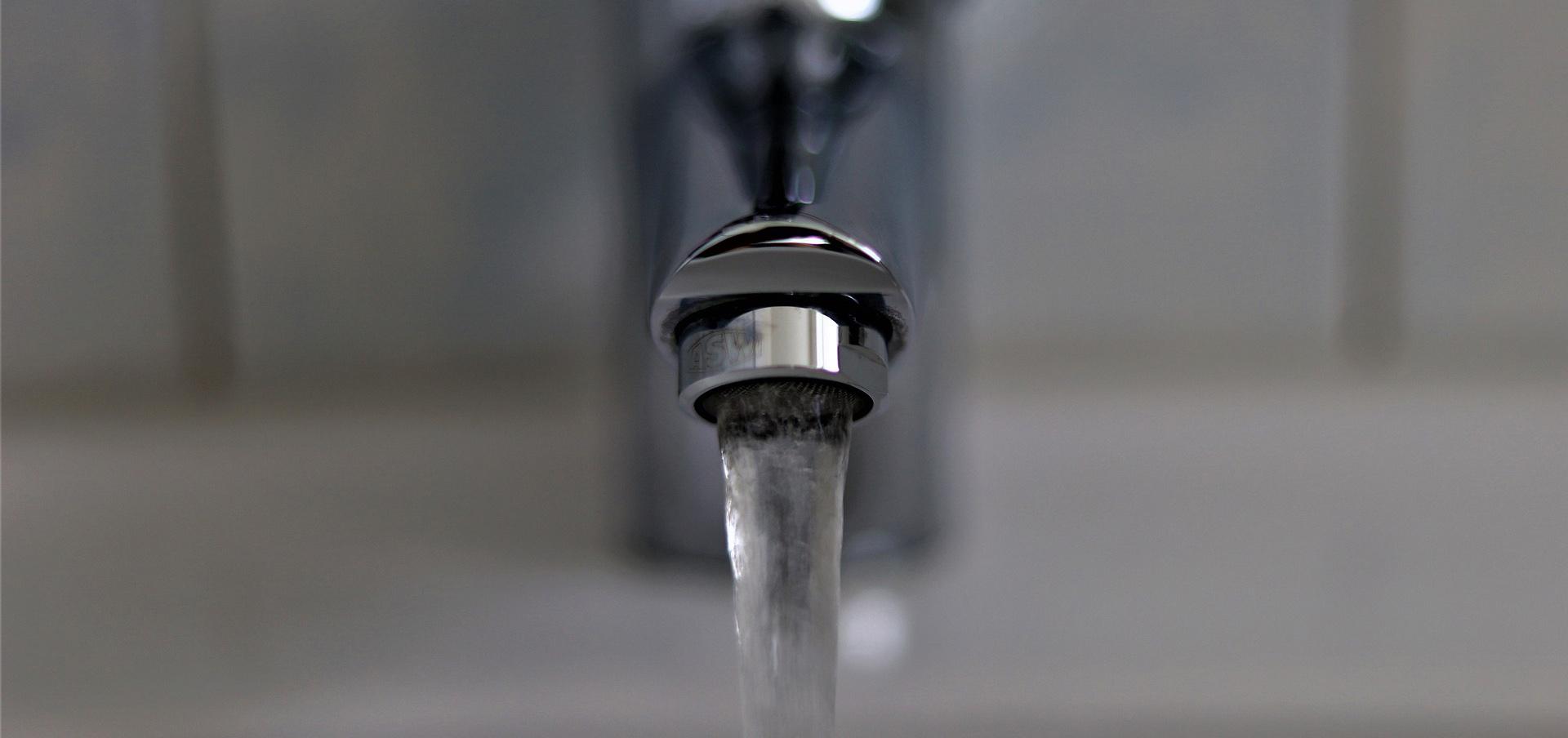
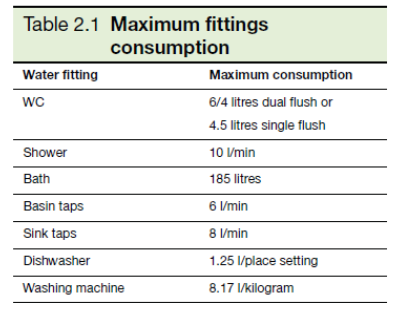
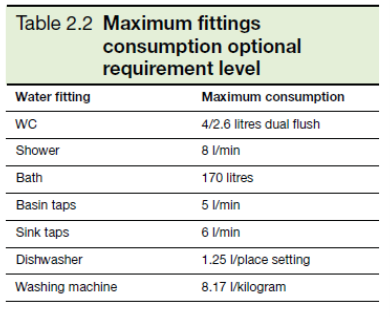
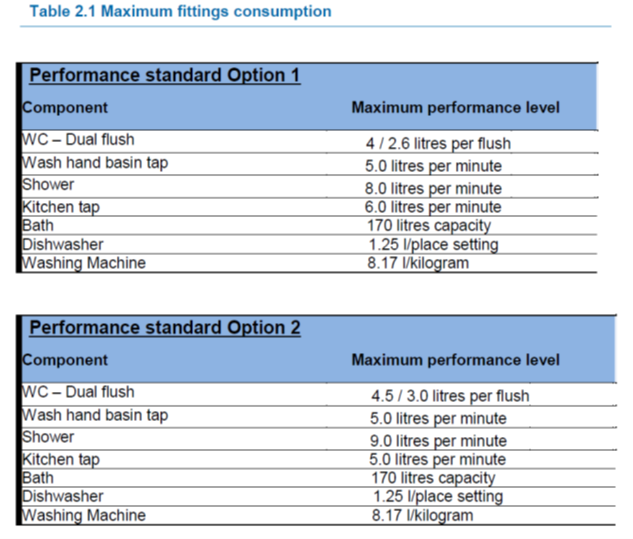
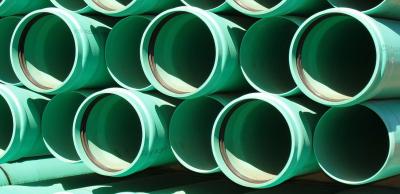
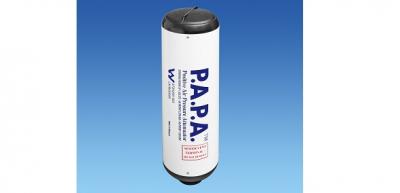
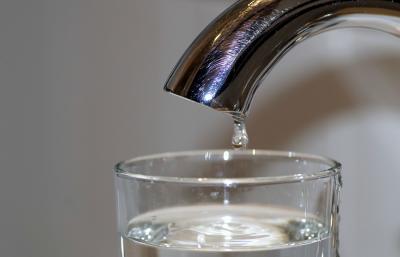
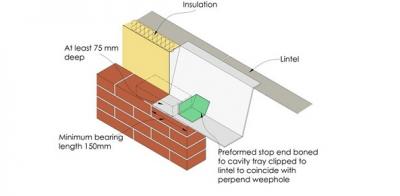
Comments
Water usage in practice
Submitted 3 years 2 months ago
Is there a metering device that closes the supply until tomorrow when the household limit is reached? Otherwise a "limit" is completely meaningless.
LABC response
Submitted 3 years 2 months ago
There is no water meterage or mechanism to prevent the overuse of wholesome water in a new dwelling – a dwellinghouse or a flat.
The designer and builder must ensure that fittings are adequate to meet the potential daily usage stated under regulation 36(2)(a) or (b), to show that the dwelling can, where occupants use appliances and fittings in a normal manner, provide the necessary water efficiency levels to satisfy Building Regulations 36 and 37 and requirement G2. Approved Document G provides further guidance under section G2 and in Appendix A.
Upon completion of the building work for a new dwelling (a newly erected house or flat, or one that has been created by a material change of use - excluding a change of use in a building with at least one dwelling, where there has been created a greater or lesser number of dwellings than existed before the change) a notice must be given to the Building Control Body, before a Completion Certificate can be given, which specifies the potential water consumption of wholesome water per person per day, for which the water efficiency calculation results can be used.
Further info:
https://www.legislation.gov.uk/uksi/2010/2214/part/7
https://assets.publishing.service.gov.uk/government/uploads/system/uploads/attachment_data/file/504207/BR_PDF_AD_G_2015_with_2016_amendments.pdf
Best,
LABC team
Water Use Targets
Submitted 2 years 4 months ago
I just submitted the last question to you and had one final item to add - Is the 125L PPPD Target based on the number of apartments OR the number of people (occupancy) in a building?
For example, the building was submitted to planning for 300 units, so when monitoring if we are achieving 125L PPPD - would we divide water usage by 300 OR would we divide by the total number of occupants to get a PPPD score?
Thanks
LABC response
Submitted 2 years 4 months ago
Thank you for your recent question concerning the scope of water efficiency calculations for flats (dwellings). We note that you have asked two questions in quick succession regarding the application of both the 110L PPPD and the 125L PPPD limits. Moreover, you have not indicated if the building is situated in England or in Wales and we are conscious that different requirements are in place for both nations.
For England the regulation is in relation to the water efficiency calculation for a dwelling and Part 7 of the Building Regulations deals with water efficiency by way of regulations 36 and 37(https://www.legislation.gov.uk/uksi/2010/2214/part/7), which are intended to support compliance with requirement G2 of Schedule 1(https://www.legislation.gov.uk/uksi/2010/2214/schedule/1). Guidance can be found in Approved Document G (2015 edition as amended) (https://assets.publishing.service.gov.uk/government/uploads/system/uploads/attachment_data/file/504207/BR_PDF_AD_G_2015_with_2016_amendments.pdf). In particular we would draw your attention to Appendix A of the Approved Document.
For Wales the same regulation applies to dwellings, as it does for England. However, in Wales an additional requirement, G2A, is in force for the water efficiency of buildings other than dwellings and healthcare buildings. Guidance can be found for water efficiency calculations for both types of buildings in Approved Document G (2010 edition as amended) (https://gov.wales/sites/default/files/publications/2019-05/building-regulations-guidance-part-g-sanitation-hot-water-safety-and-water-efficiency.pdf)as well as the 1 Nov 2018 amendment to ADG (Wales) (https://gov.wales/sites/default/files/publications/2019-05/building-regulations-guidance-part-g-sanitation-hot-water-safety-and-water-efficiency-amendments.pdf).
For both nations the meaning of “dwelling” is given in regulation 2(1) of the Building Regulations 2010 (https://www.legislation.gov.uk/uksi/2010/2214/regulation/2) as amended. We would also draw attention to the final paragraph of the section headed ‘Performance’ within the section for G2 in ADG.
We note that the water efficiency calculation metric is in relation to the amount of water consumption expressed in Litres/Person/Day. Consequently, we take this to mean it is not as a measure of the number of dwellings/flats. We further note that the water efficiency calculation is –
“…..not a design tool for water supply and drainage systems. It is also not capable of calculating the actual potable water consumption of a new dwelling. Behaviour and changing behaviour can also have an effect on the amount of potable water used throughout a home.”
Best,
LABC team
Water efficiency for building control.
Submitted 1 year 5 months ago
LABC Response
Submitted 1 year 5 months ago
Thank you for your enquiry.
The need for a water efficiency calculation has been a part of Building Regulations since October 2015. We would refer you to Appendix A of Approved document G, this shows the methodology for new dwellings and in particular table A1 which will allow you to input the data required.
Best,
LABC Team
water efficiency
Submitted 1 year ago
LABC Response
Submitted 10 months 3 weeks ago
The form can be found in Appendix A of Approved document G.
Best wishes,
LABC Team
Water efficiency — bathroom with shower fittings
Submitted 12 months ago
LABC Response
Submitted 9 months 3 weeks ago
Best,
LABC Team
Ychwanegu sylw newydd